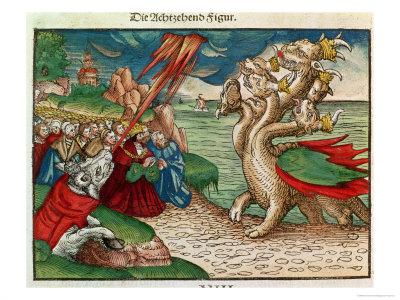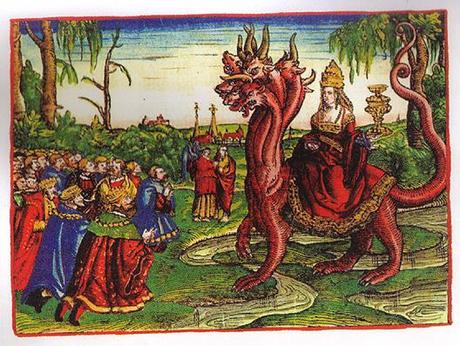Elaine Pagels is an unlikely celebrity. It is not often that professors of religion write books which so thoroughly and successfully straddle the professional/popular divide. Pagels has written many such books:
- The Gnostic Gospels
- Adam, Eve, and the Serpent: Sex and Politics in Early Christianity
- The Origin of Satan: How Christians Demonized Jews, Pagans, and Heretics
- Beyond Belief: The Secret Gospel of Thomas
Pagels’ well-deserved appeal is a bit perplexing. Christians and non-Christians read her books. The former are invariably challenged and the latter always enriched. It is a rare kind of balancing act, impelled at all times by piercing and impertinent questions. I love reading her stuff and am looking forward to her forthcoming book, Revelations: Visions, Prophecy, and Politics in the Book of Revelations.
Pagels recently previewed the book in this splendid video lecture, which is long (over an hour). There is also a transcript, from which I have excised the following as a teaser:
——————————————-
I started with three questions. First, who wrote this book? And what was he thinking? Second, what other books of Revelation were written about the same time? How did this book, and only this one, get into the Bible? And what constitutes the appeal, whether you’re talking psychologically, literarily, politically, of this book?
The evidence suggests that John was a Jewish prophet. He was living in exile around the year 90 of the first century. We can’t understand this book until we understand that it was written in war time, or shortly after war. John was a refugee, apparently, from the Jewish war that had destroyed his home country, Judea, started, as you may know, in year 66 when Jews rebelled against the Roman Empire.
When John traveled through the provinces of the Roman Empire, particularly in the province called Asia Minor, which is now Turkey and Syria, John would have seen that every evidence that the kingdom that had come with power wasn’t God’s kingdom. It was Rome.

John says it was while he was in that area, right near Ephesus, that he first heard a divine voice, and had a terrifying vision in which Jesus said that Israel’s God is about to come and destroy the evil powers of the world once and for all. What John did in the Book of Revelation was draw on the cultural resources of his own people to create, if you like, anti-Roman propaganda.
When John of Patmos asks, “How long is God going to allow evildoers to triumph over Israel?” he says Jesus told him what the earlier prophets had said, that God is about to come and finish the cosmic war he started in the beginning of time, and kill the dragon who embodies the forces of evil once and for all. John of Patmos triumphantly says that today’s Babylon, which is Rome, although it’s raging like Leviathan, is decadent as the whore, is about to fall as Rome triumphs.

Although, for over a thousand five hundred years, John’s book has been in the New Testament, John had no anticipation of a New Testament, because his only scriptures were the Hebrew Bible. John regarded himself as a Jew who had found the Messiah. And would have been shocked to learn that his future readers regarded him as a Christian. As far as he was concerned, Christianity hadn’t yet been invented. John never uses the term Christian.
[W]hat made this book so appealing, and for whom, that it was included in the New Testament and proved so influential? I mentioned this book was very controversial when John wrote it. And it’s not surprising that the people who championed this book during the next hundred to 200 years were followers of Jesus who were experiencing or witnessing Roman persecution first hand. They were living under threat of being arrested, tortured, executed, for atheism and treason. During those dangerous times, many of them found in John’s prophecy hope that Rome, which was of course indomitable, was going to just fall and collapse at the end of the world.
[W]hen Emperor Constantine shifted the Roman world toward Christianization, you might have expected that this book would get left in the dust, with other books of disproved prophecy. Many of them did. Over several decades, after Constantine and his successors became the patrons of the Christian Bishops, a lot of Christian leaders began to draw up a list, a canon, of authorized books. Canon means a standard. It’s a measure you hold up to see what’s a standard. And many of them drew up lists of books.
What’s interesting to me is that, well, the earliest account we have is by a friend and counselor of Constantine, Eusebius, Bishop of Palestine, Caesarea, and he says in a very early account, well, he has a list of the recognized books. And he says, and if it’s right, if it seems right to you, well, The Book of Revelation, we could add to that. Then he has a list of disputed books, and then it puts at the end of the disputed books, none of which are now in the New Testament. Well, if it seems right, maybe The Book of Revelation; because it’s one of the most disputed books. We don’t know. It’s very highly disputed.
We have only five lists that remain from the year 350 to the year 400 of canon books, and you can see that the Bishop of Jerusalem, the Counsel of Bishops in Asia Minor, Gregory of Nazianus, this one’s the Fathers of the Church and other bishops, they all have many books that are now in the New Testament. But every single list leaves out The Book of Revelation very deliberately, except the one list that happened to be the list that was adopted. And that book is included on Athanasius’ list, the Bishop of Alexandria, in Egypt.
[W]hat made Athanasius’ take on Revelation different? Was it that he could actually reinterpret all the prophecies. Instead of taking John’s prophecies as referring to God’s victory over evil powers embodied in Rome, he said, well, you can’t take it literally. We’re going to apply John’s vision of cosmic war to my lifelong battle, which is a lifelong battle to establish a Catholic church which is a Catholic church endorsed by the Roman Empire. This will become the church of what later becomes the Holy Roman Empire.
Athanasius was trying to create a Christian communion, which was supposedly universal Catholic, and he insisted that the war between the forces of good and the forces of evil is not against Rome, but it’s against deviance and Christians who oppose the new Catholic church, either Pagans, later against Jews, and also against those he called maniacs and heretics.
Athanasius says, well, the beast is really not about Rome. The whore is not about Rome. The beast and the whore represent heresy. And when Jesus divides the saved from the damned, it’s really the Orthodox Christians being divided from Pagans, Jews and heretics. And that is the way he pictures it throughout all of his writing. I mention this only because his spin on these prophecies shows us, gives a clue about how this book has survived for a couple thousand years.
It’s very clear that John had very specific targets in mind when he was writing. For example, if you read about a great mountain that suddenly erupts, and is thrown into the sea and pollutes the waters for days, he’s thinking about the eruption of Mount Vesuvius that happened in the year 79, about ten years before his writing. And everybody would know that. And if he’s writing about the great beast whose human number is six hundred and sixty-six, you know that he’s either thinking about the imperial name of the emperor Nero, who was the one you’d choose for the worst possible emperor, or Domitian, who was ruling at the time John wrote. He had very specific targets in mind.
[John] couches his meaning in images that could be easily deciphered by his contemporaries, but also hidden, because it was dangerous to attack Rome directly. In this kind of dreamlike image, those images, as you know, have been plugged in to almost any conflict ever since. They speak less to the head than to the heart, and to very intense emotions that shape our dreams.
(End of My Brief Excision)
———————————————-
My own reading of Revelation isn’t very dreamy, except to the extent that nightmares are dreams.
Isn’t it ironic that Athanasius made the case for canonization or inclusion in the Bible by arguing that Revelation should be interpreted metaphorically, and today there are many millions of people who interpret it literally?
Otherwise, there is a great deal more to Pagels’ lecture and I encourage you to watch the video in its entirety or read the whole transcript. It looks like Pagels’ next book will be another success.


